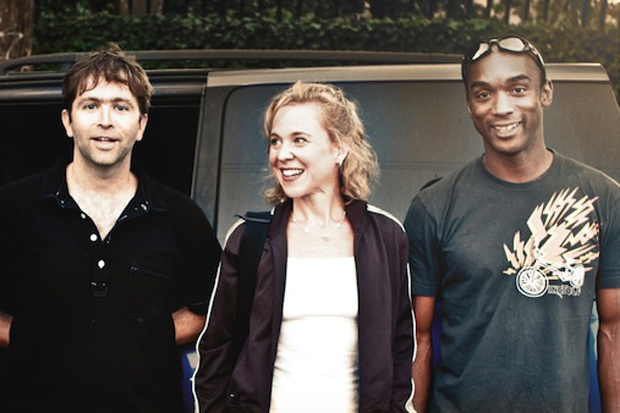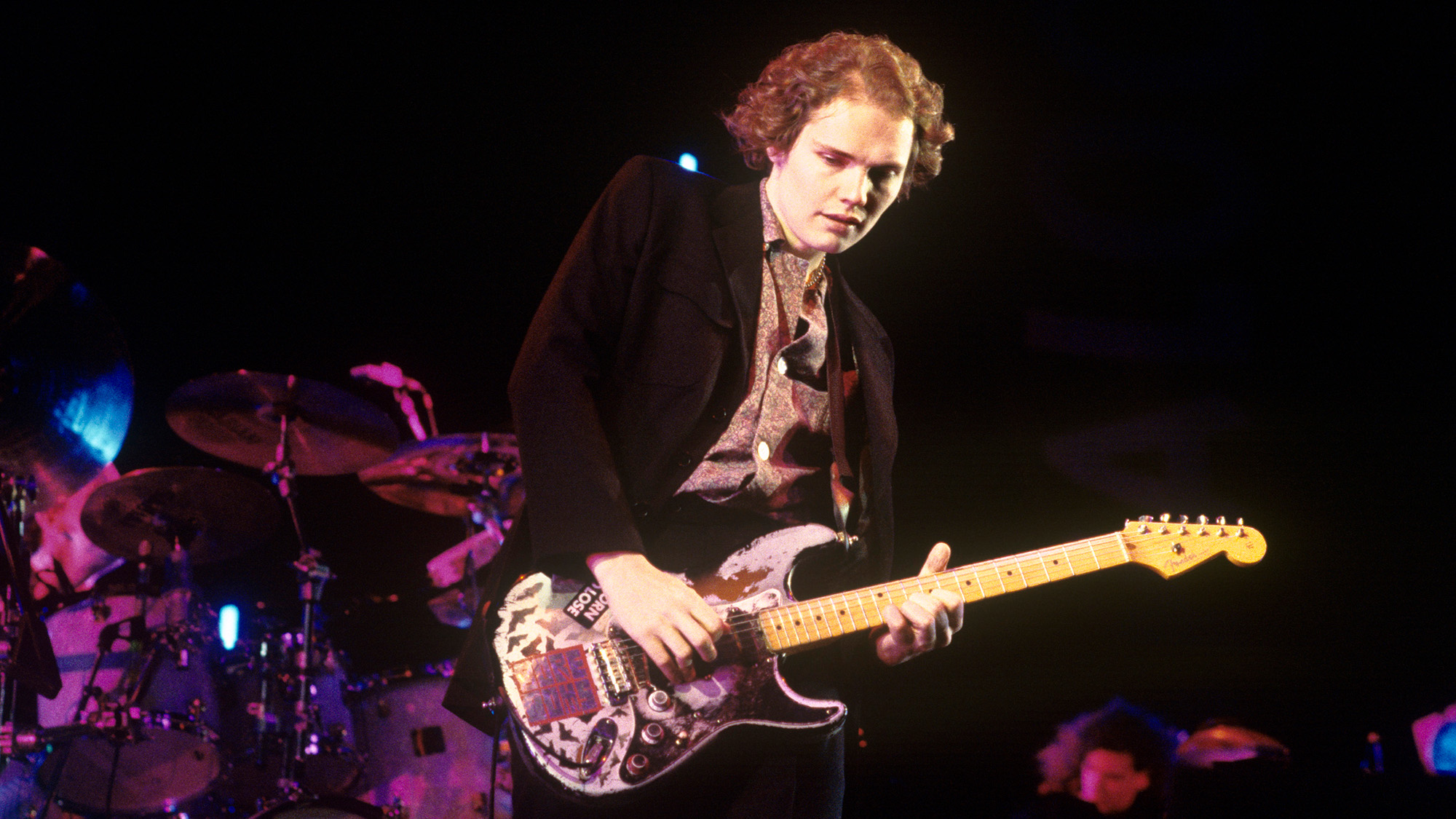Guitar Girl’d: Interview with Kristin Hersh of Throwing Muses on New Release, 'Purgatory/Paradise'

As one of the most popular indie-rock acts of the ‘80s and ‘90s, Throwing Muses helped pave the way for a host of female-fronted bands that followed.
Now, after a 10-year absence, Throwing Muses have returned with Purgatory/Paradise, a release that might be one of 2013’s most intriguing records. Accompanied by a book featuring photography and artwork from vocalist/guitarist Kristin Hersh and drummer Dave Narcizo, in addition to stories and essays by Hersh, Purgatory/Paradise is a sprawling 32-track compilation.
Seldom breaking the two-minute mark, the tracks are more like snapshots rather than typical verse-chorus songs. Nonetheless, Purgatory/Paradise feels like a full body of work and delivers many surprises along the way. It’s raw, honest and uncompromising, much like Hersh.
Below we chat with Hersh, who in addition to her work with Muses, stays busy with her solo work and second band, 50 Foot Wave.
GUITAR GIRL'D: Let’s talk about your new album.
Sure. It took five years to make, and the last year was pretty intense because, well, music is music, you know. You could say we “spawned it,” but the better term might be that we were “battered by it.” Our name should’ve been Thrown by Muses.
The record took three or four years, and the last year was pulling together the book itself, which I claimed was impossible, hoping to get out of doing the work, ha ha. My opinion was “music is music — it stands alone.”
All the latest guitar news, interviews, lessons, reviews, deals and more, direct to your inbox!
Dave, the drummer, started putting together the images, so then it was too late! I had to write 32 essays that reflected the way these songs move in and out of each other with concurrent themes, reflecting the textures and colors of Dave’s work and the movements within the material. And I had to come to some fucking conclusion at the end of it somehow.
For a week I just pouted. Then I listened to it and realized you just need to sit with the song in this atmosphere and start telling a story. And it was so easy. Maybe “easy” isn’t the right word, but it only took about six months, and I think it’s the best thing I’ve ever written. It’s not due to me. It’s because music is so much smarter than me. It just tells you what to say.
The writing is so interesting and engaging. You did a good job!
Oh, thank you. We’re very close in this band and we live on this dome-island. Our world is goofy but graceful. We adore it, but it’s not for everyone. This whole project is just a keyhole into what we do in a big barn, whether anyone is paying attention or not. Which is a different take on the music industry’s extroversion, you know?
Yes. When I first looked at the album, I was surprised to see 32 pieces of music, but I feel they’re little parts of a whole.
Yeah, we started with 75 songs because we had so many years off. We had a backlog of material. Because we differ from the recording industry ethically, we had been asked to dumb down our product so many times. I have been asked to act and look like a bimbo so many times and I just decided, “I’m not going to turn my back on my music. I’m not going to turn my back on women.”
We’re morally bound to not participate in the traditional recording industry because we disagree with it. So we continue to play music, which has nothing to do with the music business. And this time, we had to figure out a way to engage publicly — and not suck — because our listeners were supporting it. If we presented them with something that was actually marketable, they’d reject it. All they want is something raw and authentic, and really, that’s all we can do. We tried to maybe fake it once or twice in our careers, and I regret having even tried. We sucked at it.
I think it’s refreshing how it’s not such a typical sound. Its something you actually have to listen to.
I know what you mean. Music is the only language I speak fluently. I listen to a lot of CDs, and I know instantly what they’re doing. You just can’t lie to me. It’s music. I suppose disappointment would be the word for it. I’ve been disappointed so many times that it’s not even a factor anymore. I feel like music has more in common with the textures, impulses and activity I see around me than it does with the sounds I hear.
Can you tell me a little about the recording process?
We work in a horse stable. It’s an actual recording studio but just happens to be adjacent to a stable. There are a lot of horses on the record. You have to listen carefully, but they’re there. We’ve been recording there for about 25 years. 50 Foot Wave records with Mudrock in Los Angeles, but for my solo work and Throwing Muses, If we’re not in New Orleans, we’re here on the island.
It became clear when I was making the demos that this record was all about human feel. That meant we couldn’t use a click track and drums couldn’t go down first, or it would be too tight. As a trio, you’re trained to be tight. If you’re sitting behind the beat or on top of the beat you can move the feel a little bit, but it’s not going to have that nice wavelike, fluid timing you need in order to not sound too neat. So what I did was record my parts first, which is very unusual and was very difficult for the rest of the band.
The sequencing was so important with all of these songs, with some of them being so short, you know. What that meant was lots of nights that didn’t end, lots of experimentation and lots of erasing. We ended up with exactly what we wanted. It’s fragile and it still has balls.
There's is a dynamic flow to the album. You weren’t afraid to pull back and be really stark, but you can really push it too.
As long as it’s balanced. I find that one can’t live without the other, really. Sometimes you want to put out a record that’s a mood piece, but this one was never going to be that. We had to go for the opposite and just present the extremes, hoping that they’re complimentary rather than contrasting.
Can you talk a little about your gear?
Oh my god. There are so many songs, so many guitars and so many effects. For amps, we used an Ampeg Rocket, a Fender Studio, a Supro 16t, a Vox Cambridge reverb and a Harmony H410. As far as guitars and basses, we used a Strat, Tele, a Nashville-tuned Gibson 45, and a Les Paul — all from the '60s and '70s. Then we used a ’70 Fender Jazz bass, a ’70 Fender P-bass and a Reverend bass.
For effects, we used a Maestro Fuzz Tone, a Rat, a ‘70s Big Muff, a Roger Mayer octave pedal, a ‘70s Vox wah and a ‘70s Umi Buzz Tone.
So you experimented with a lot of different gear choices. Did you do that purposefully to try to have that variety?
I had to. Even minor tweaks in the production approach — like moving the mic across the room — help to differentiate the song from those around it. Even if it was 30 seconds long, it had to have a whole mood and production approach of its own.
Do you have a process for songwriting or is it different for every piece of music?
My writing process has always been the same. At 4 a.m., I hear noises that begin to differentiate themselves into a sonic vocabulary. What I hear is strange, but what I end up with is not, because I don’t like to alienate people. One of the instruments will morph into melodic syllables, and that’s what the lyrics are. I just copy it all down, learn it on guitar, and that’s what the song is to me.
Do you do this all alone or do you work with the other members in the band to put it together?
All alone. Totally turned off. If I called them at 4 a.m. ...
“Hey, wake up!”
It’s always been like that. We started the band when we were all 14 years old. I play them a song body and, you know, we recreate it effectively, and then we have it. I guess we could mix things up, but now we’re too old!
As a female musician, have you faced any challenges?
I don’t feel particularly female. People don’t treat me particularly female. Sometimes with solo records they’ll start to treat me like a girl. But when you’re in a band, they sort of throw you up against a wall and take your picture. For my solo work, I’ve had to do photo shoots. I was just trying to be a good soldier, but when I was realized what was happening, I said, “No, this is not right. This is bad for women and this is bad for music and I don’t want these people at my shows anyways.” Whoever the fuck is going to be interested in music because I’m in my underwear can go home.
Did you get a lot of resistance for refusing to do them?
Oh, they don’t give a shit about me. At a photo shoot, there would be a stylist, a makeup person and a hair person, then all the photographers and assistants. They would kind of look at each other and go, “We’ve got our work cut out for us.” I was like, “Fuck you, I don’t want to be here.”
Now it’s a new world. It could be called failure. For me, it’s freedom. I do not like playing that game. And I would feel guilty if any of those pictures were published. I would have mad fans writing me like, “How could you?” And I’d say, “I thought I was being nice!”
Will you guys be touring to support this new release?
Yeah, we should be on the road right now, but our bass player [Bernard Georges] hurt his hand very badly and it won’t heal until early 2014, which is when they’re now booking shows.
Is there anything you’d like to share regarding your other projects?
Yeah, there are two solo records coming out. Actually, a 50 Foot Wave record should be the next release, because that’s in the can already. It’s really excellent. I love this one. It’s out in Mudrock’s hands in Los Angeles right now, but as soon as the Muses hullaballoo dies down, I’ll release the 50 record.
And then who knows about the solo stuff. I work too much but there’s no record company to tell me not to, finally. I guess their concern was oversaturation, though, which was never going to be a real concern. I’ve never oversaturated anything!
Find out more at kristinhersh.com and throwingmuses.com.
Laura B. Whitmore is the editor of Guitar World's Acoustic Nation. A singer/songwriter based in the San Francisco bay area, she's also a veteran music industry marketer, and has spent over two decades doing marketing, PR and artist relations for several guitar-related brands including Marshall and VOX. Her company, Mad Sun Marketing, represents Dean Markley, Peavey Electronics, SIR Entertainment Services, Music First, Guitar World and many more. Laura is the founder of the Women's International Music Network at thewimn.com, producer of the She Rocks Awards and the Women's Music Summit and co-hosts regular songwriter nights for the West Coast Songwriters Association. More at mad-sun.com.
